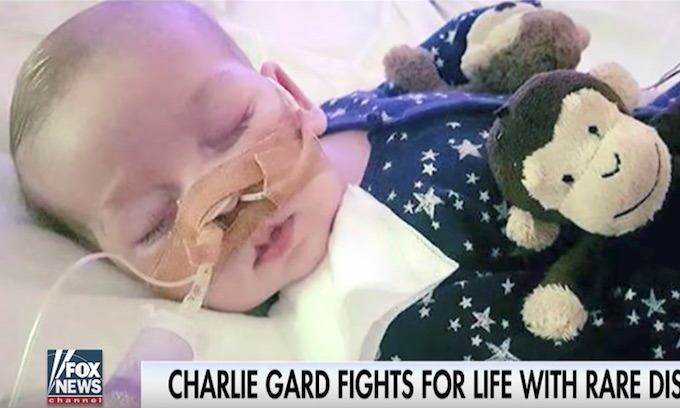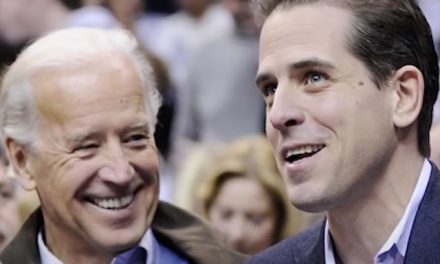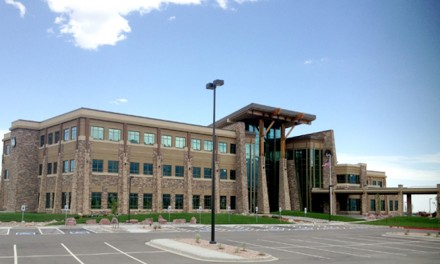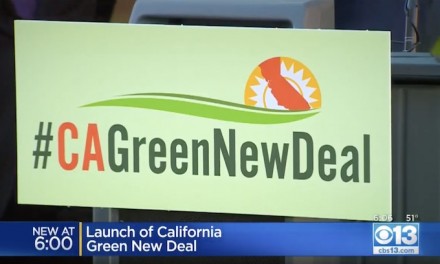Eleven-month-old Charlie Gard is desperately ill with a rare genetic disorder. He can’t breathe or move on his own. He’s blind and deaf. He suffers from epileptic seizures. Doctors in London say his illness can’t be treated effectively and that he likely will die soon after life-support is withdrawn.
Charlie’s parents, Connie Yates and Chris Gard, are fighting to bring their son to the U.S. for experimental treatment. They’ve raised $1.7 million on a crowdfunding website to do so.
But Charlie’s doctors, and the British courts, won’t let him go. Medical authorities argue that prolonging his life by keeping him on a ventilator could cause him pain. British authorities won’t even let the parents take him home to die.
The case has drawn global attention. President Donald Trump has tweeted his support for Charlie, saying “if we can help … we would be delighted to do so.” A Vatican spokesman says Pope Francis also has followed the case, praying that the parents’ desire “to accompany and care for their own child to the end is not ignored.”
You may find the British authorities outrageously heartless or merely humane in gauging that Charlie’s chances for survival, much less a productive life, are vanishingly slim.
Either way you may ask: Why does the British government have such wide authority over Charlie’s treatment? One big reason: Because the government funds a single-payer health system, picking up medical costs for British citizens.
We imagine many Americans reassure themselves that this country’s largely private system of health insurance would never be so dismissive of a parent’s right to make decisions about a child’s health care. Or deny a parent the right to take a child home to die.
But this medical drama, no matter anyone’s opinion, foreshadows the difficult decisions to come if America converts its medical insurance system into a single-payer model. (Note that “single-payer” is a euphemism for government-controlled health spending and care.)
The prospect of single-payer here isn’t far-fetched: Medicare and Medicaid already account for about 38 percent of U.S. health care spending. Democratic politicians have floated the notion of lowering the Medicare eligibility age from 65 to 55, or of a broader Medicare-for-all. Before Obamacare became law in 2010, there also was talk of a so-called public option — a government-run plan — to compete with private plans on market exchanges. That was widely seen as a Trojan horse for single-payer.
Now that Obamacare is faltering, talk of a single-payer national plan has surfaced anew in Democratic circles, notably California. In June, the Democrat-controlled state Senate passed a preliminary plan that would have covered all California residents, with no out-of-pocket costs, for an estimated $400 billion annually. That proposal evidently has died. For now.
On a national scale, single-payer would more than triple government health care spending, by $32 trillion over a decade, the Urban Institute estimates.
Single-payer advocates say such a system would be more cost-efficient. To the extent that’s true, it’s partly because single-payer systems often deny expensive, experimental treatments and drugs, forcing patients to pay out of pocket. Or patients endure long waits for common surgeries. Or patients can’t get those pricey, modern treatments.
Many citizens of Canada, the U.K. and some other single-payer countries reluctantly have grown accustomed to such limits. But imagine the political backlash if American lawmakers imposed them here. Bottom line: Single-payer is no panacea. Free treatment isn’t free. Somebody — everybody — pays. To which proponents of single-payer would retort: Private insurers aren’t models of generosity: Sometimes they pay for costly new treatments, sometimes they don’t.
Chris Gard and Connie Yates probably never thought they’d be in this predicament, arguing with the British government about whether they could take a child home to die. Nor could anyone predict that a critically ill infant far from U.S. shores would provide one more reason for Americans to remain wary of a single-payer system.
___
(c)2017 the Chicago Tribune
Visit the Chicago Tribune at www.chicagotribune.com
Distributed by Tribune Content Agency, LLC.
—-
This content is published through a licensing agreement with Acquire Media using its NewsEdge technology.



















Recent Comments